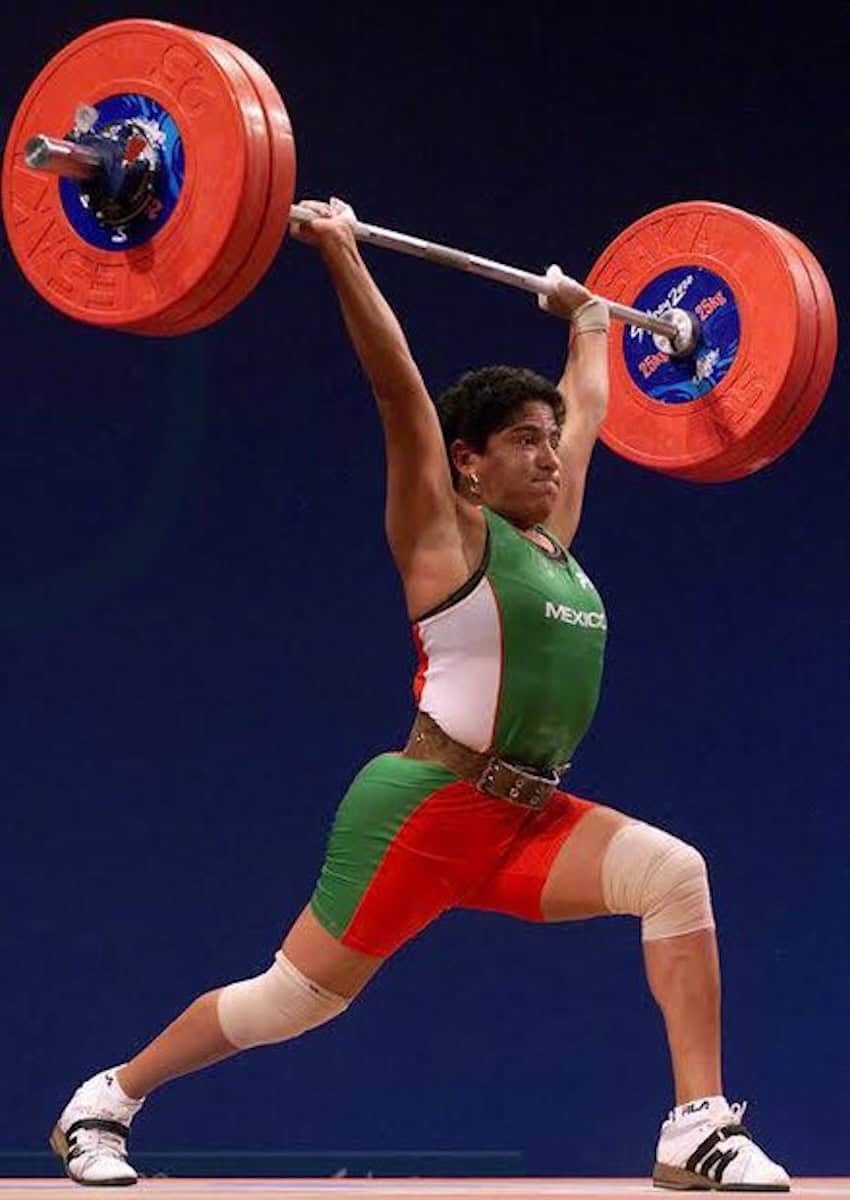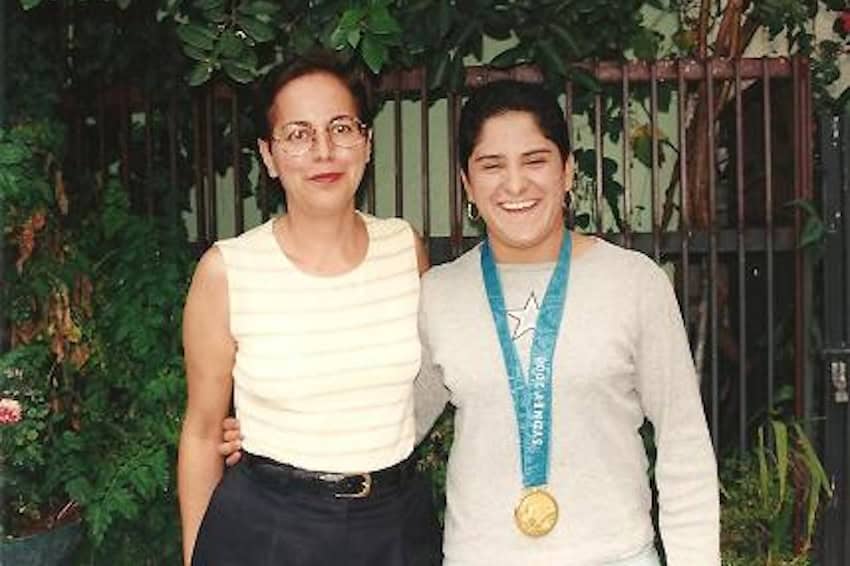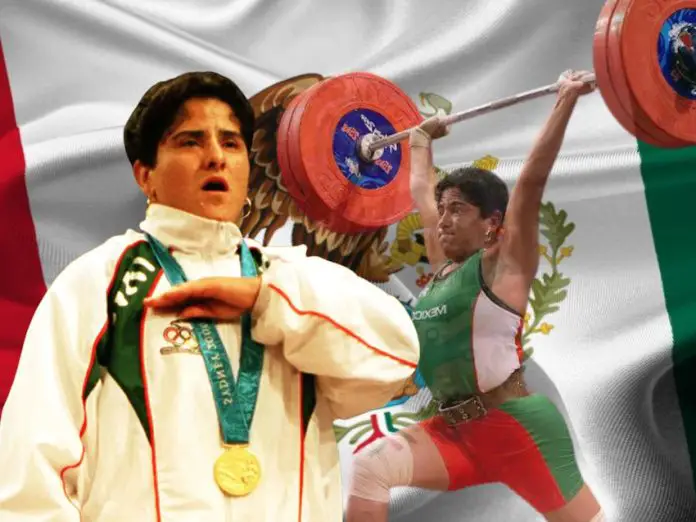An Olympic medal, even an Olympic title, is not an automatic door to fame and fortune. This is particularly true for the less popular sports; Olympic weightlifting, if it makes TV at all, is likely to be summarized in a 10-second clip of a winning lift or a dramatic tumble. That’s a shame, because those who settle down and watch a competition from start to finish will witness a combination of raw strength with chess-like decision making. The sport has also produced one of the most unlikely victories in Olympic history and a truly golden moment for Mexican sports — the moment that Soraya Jiménez won the women’s lightweight gold medal at the Sydney games in 2000.
Jiménez was born in Naucalpan de Juárez in 1977. She and her twin sister Magalí dabbled in sports at school; the girls were competitive but not outstanding in ability and it wasn’t until Jiménez discovered weightlifting that she found an arena she might excel in. By 16, she was representing Mexico in international competitions, but Mexico was hardly a powerhouse in the sport. Dominance in weightlifting was shifting from Eastern Europe to Asia, particularly in women’s events.

In 1996, Jiménez traveled to Poland for her first World Weightlifting Championships, finishing 11th. While 11th in the world appears a respectable achievement there were only 14 competitors, and she lifted 50 kilos less than the winner. Competing in a World Championship could have been a one off for Jiménez; the highlight of a career that might have brought some national and regional success but would have been well short of world class. But she persevered, improving each year as her support team gained a better understanding of what it took to be competitive on the world stage.
In 1999 this experience combined with her new maturity for a breakthrough. At the World Championships in Greece, she climbed to 8th place in a field of over 40, with a combined lift of 197.5 kg — 50 kilos more than she had achieved in her first World Championships just three years earlier. There was also new motivation: women’s weightlifting had just been added to the Olympic program.
While an Olympic medal looked ambitious at this stage, it was no longer an impossible dream. An Olympic title however was another matter, for there were two quite outstanding competitors in this weight category: North Korea’s Ri Song-Hui and China’s Chen Yanqing.
Weightlifting at the 2000 Games was staged in the Convention and Exhibition Center, a building dramatically set on the Sydney waterfront. Even before the women entered the arena there was a shock when Chen Yanqing withdrew from the competition. Jiménez was traveling to Australia with a series of international wins to her credit and, the withdrawal of her Chinese rival brought her one step closer to an Olympic medal.
In the snatch part of the competition — in which lifters raise the weighted barbell overhead in a single motion — Jiménez started at 90 kg and achieved three successful lifts, finishing at 95 kg. However, she did not look totally comfortable. At 92.5 kg she stumbled around in a quarter circle before completing the lift; while attempting 95 kg she came close to losing control. It had not been classic weightlifting, but it all counted, and Jiménez would go into the clean and jerk in second place.
In the clean and jerk, the lifter first takes the weighted barbell from the ground to their shoulders — the clean — and then jerks it overhead. Ri Song-Hui was leading at this stage and looked outstanding. She had started at 95 kg and then lifted 97.5 kg. This had been a textbook lifting: smooth, fluent and rock steady. Although she had made it look easy, 95 kg had pushed the Korean to her limits and she declined a third attempt. She was 2.5 kg ahead of Sorya, who was her nearest challenger, and the Korean had a lighter body weight. When two weightlifters clear the same weight, victory goes to the lighter competitor.
Jiménez’s clean and jerk was her stronger discipline and she opened with 117.5 kg. With third-placed Khassaraporn Suta of Thailand needing two attempts at this weight, the silver medal was looking increasingly secure for Mexico. Ri came in at 120 kg, once again making it look easy. She now had a 5 kg advantage over Jiménez — surely a decisive margin at this stage of the competition.
Jiménez took a gamble, passing on 120 kg: she wanted 122.5 kg on the bar. She struggled on the clean, but once the bar was up to her shoulders she looked good, confidently jerking the bar up for a good lift. Jiménez had secured the silver medal, with Ri still favorite for the gold. Then the whole competition was turned upside down.

In weightlifting, a buzzer warns competitors that they have 30 seconds to start their lift. Ri Song-Hui was following Jiménez at attempting 122.5 kg but for some reason, she was still in the waiting area when the buzzer sounded. Nevertheless, she seemed quite unhurried as she came up the steps to the lifting platform. She approached the bar, readjusted it a little, and stepped backward to recompose herself. As the Korean placed her hands on the bar the buzzer sounded: she had timed out and recorded a foul. It was a basic mistake that should never happen at this level.
Ri came up for her second attempt at 122.5 kg and this time there was no mistake, she lifted it with ease. She now had a 2.5-kilo advantage from the snatch, was equal with Sorya in the clean and jerk and had the body weight advantage. “She could be moments away from gold and should be,” one American commentator excitedly noted. “I think that is a virtual lock for the gold.”
But having wasted one of her three attempts, Ri was now finished, while Jiménez still had her third and final attempt left. To steal the gold medal she would have to skip over 125 kg and try for 127.5 kg, a weight far above her personal best. She was lifting increasingly well, with her jerk looking particularly strong, but 127.5 kg would surely prove too much.
The Mexican came forward and cleared the clean with surprising confidence. She jerked the bar up. Jiménez stumbled a few steps, but held it long enough for the judges to signal their approval. It was a clean lift: gold for Mexico.

It was a glorious moment for Mexico, for weightlifting and for Jiménez’s years of dedication to the sport. However, there were difficult times ahead. Jiménez entered the World University Championships but was disqualified when it was discovered that her paperwork for UNAM was not in order. In 2002, she tested positive on an anti-doping control and was suspended for six months. Later exonerated, she attributed the positive to medicine she had taken after surgery.
She retired from weightlifting in 2004, prior to the Athens games, and became a sportscaster for Televisa. Weightlifting puts an immense strain on knees and back and over the years Jiménez struggled through numerous operations that took an additional toll. Her immune system was further impacted by several bouts of the flu and a surgery that removed her right lung.
On March 28, 2013, Soraya Jiménez passed away from a heart attack at the age of 35. Perhaps her greatest legacy is the handful of Mexican women lifters who have followed in her footsteps and competed at the highest level. And of course, the memory of that golden night in Sydney.
Bob Pateman is a Mexico-based historian, librarian and a life term hasher. He is editor of On On Magazine, the international history magazine of hashing.
